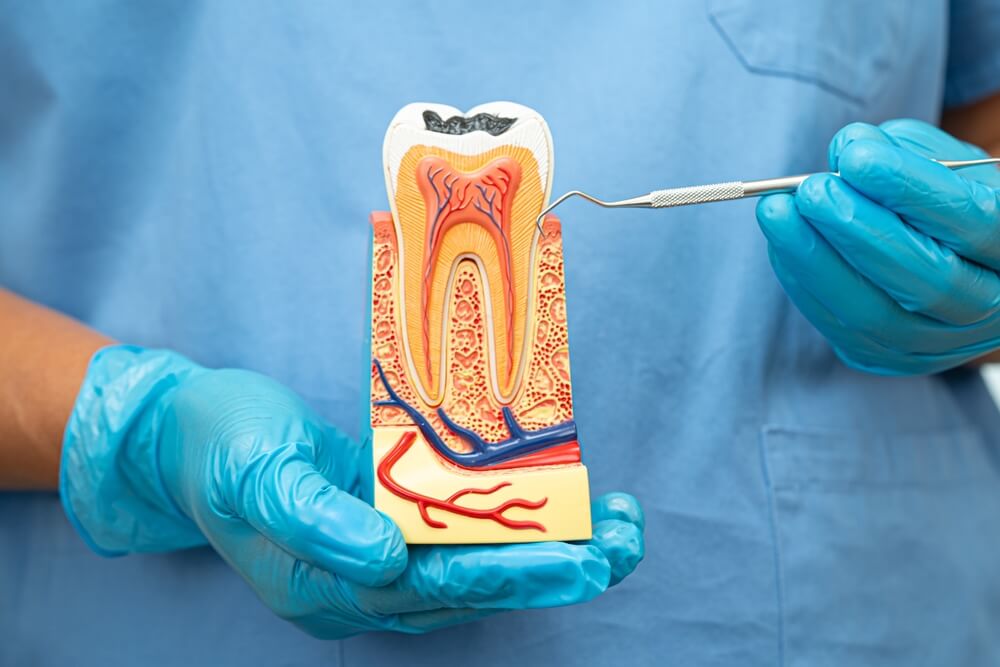
Root canal treatment is a common dental procedure that can save (preserve) a tooth that might otherwise need to be removed. It’s important to know what happens before, during, and after a root canal treatment in Downtown Vancouver to ensure optimal results from the treatment.
What Are Root Canals?
A root canal, or endodontic therapy, is a treatment used to repair and save a tooth that is badly damaged or infected. The “root” of the tooth contains nerves and blood vessels. When this area becomes infected or decayed, this can be very painful. In a root canal procedure, the dentist removes infected material from the tooth; cleans and shapes the internal structure; and fills and seals the cleaned and shaped tooth to restore its original function.
What Causes a Root Canal?
There are several reasons why a tooth might need a root canal treatment near you. Some common causes include:
- Deep decay: The untreated cavity would eventually go deep enough into the tooth to cause infection of the soft tissue.
- Repeated dental procedures: A tooth that has been filled many times or received numerous other treatments may become weakened.
- Cracked or broken teeth: A cracked tooth can allow bacteria to enter the tooth, causing infection.
- Injury to the tooth: A tooth may sometimes get injured due to a blow or accident and therefore becomes infected.
Before the Root Canal Therapy
Before your root canal treatment, your dentist will usually take an X-ray of the affected tooth to check the extent of the damage. They will also ask about your symptoms to understand how badly the tooth is affected. Here’s what you can expect during the visit:
- Local anesthesia: Your dentist will numb the area around the tooth, so you don’t feel any pain during the procedure.
- X-rays: The dentist may take pictures to see the inside of your tooth and plan the treatment.
- Discomfort: You may feel some pressure while the dentist works, but it should not hurt. If you feel pain, let your dentist know, and they will make sure you are comfortable.
During the Root Canal Treatment
Once the area is numb, your dentist will begin the treatment. The process usually takes about 90 minutes, but sometimes it may require two visits to a dental clinic, especially if the infection is severe.
- Access the pulp: The dentist will make a small opening in the top of your tooth to reach the infected pulp inside.
- Remove the infection: The infected tissue will be carefully removed to clean out the inside of the tooth.
- Shape the canal: After cleaning, the dentist will shape the space inside the tooth to prepare it for a filling.
- Fill the tooth: The tooth will be filled with a special material to seal it and prevent future infection.
- Seal the tooth: A temporary or permanent filling is placed to close the hole.
After the Root Canal
After the procedure, you may experience some soreness or mild discomfort, but this usually goes away in a few days. Here’s what to expect and how to care for your tooth afterward:
- Pain relief: Any discomfort can usually be managed with over-the-counter pain relievers. If the pain is severe or lasts longer than expected, contact your dentist.
- Swelling: Some swelling around the treated area is normal, but it should go down after a few days.
- Avoid chewing: For the first few days, avoid chewing on the treated tooth, especially if it has a temporary filling.
- Permanent restoration: In most cases, your dentist will recommend placing a crown on the tooth after the root canal. This helps protect the tooth from breaking and restores its function.
Tips for Recovery
- Follow your dentist’s instructions: Take any prescribed medication and follow the care instructions closely.
- Soft foods: Consume soft foods for a few days while the tooth heals.
- Good oral hygiene: Continue brushing and flossing your teeth carefully, but avoid the treated tooth area until your dentist says it’s safe to clean it.
When to Visit Your Dentist?
While most people recover well from root canal treatment, there are some signs that may suggest something went wrong, such as:
- Severe pain that does not go away.
- Swelling that doesn’t reduce after a few days.
- Fever or a bad taste in your mouth.
If you experience any of these, contact your dentist for further care.
Key Takeaway
A root canal might sound complicated, but these procedures can save your tooth and relieve pain. Understanding what happens before and after the treatment can make the process smoother and less stressful.
If you have any concerns or think you might need a root canal, don’t hesitate to talk to your dentist. They will help guide you through the process and ensure that your tooth heals properly.
Save Your Smile With a Root Canal Today!
At Key Dental Clinic, our team of experienced dentist in Downtown Vancouver offers effective oral care in a friendly and relaxed environment. Whether you need a routine check-up, a root canal, or any other dental treatment, we are here to help you every step of the way. Trust us to take care of your teeth so you can enjoy a healthy smile for years to come.
Book your appointment today at Key Dental Clinic!
